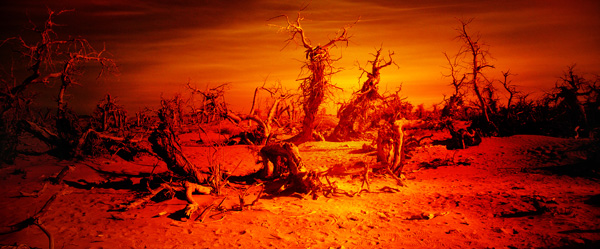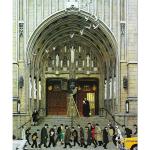
(I recently blogged about the four dilemmas of evangelicalism, which center on the doctrine of heaven and hell. If you haven’t read that post, please click here.)
So why has hell gone out of fashion? Why do we rarely speak of it in church any more?
Two reasons:
Reason #1: People have stopped dropping dead unexpectedly, which has made eternity a less compelling topic, especially among the young. I blogged on this in 2012: to read that post, click here.
Reason #2: The Christian story of eternal judgment is being replaced with a series of secular ones. These non-religious doomsday scenarios are being advanced by scientists. The media tells us daily they’re certain to happen.
Even though they probably won’t.
Scientists have a terrible track record predicting the future. It’s almost as bad as the crackpot preachers who predict the second coming.
Travel back to 1947. A group of influential scientists predicts global nuclear annihilation. They invent the Doomsday Clock, symbolizing the world’s imminent demise. The closer the clock is set to midnight, the closer we are to destruction. (The clock has never been more than 7 minutes away from midnight, yet we’re still here.)
 When I was a young man, it was widely believed the world would end in a thermonuclear fireball. The Civil Defense was everywhere. The “fallout shelter” logo was posted on thousands of public buildings. Children were taught to “duck and cover” in case of a blast.
When I was a young man, it was widely believed the world would end in a thermonuclear fireball. The Civil Defense was everywhere. The “fallout shelter” logo was posted on thousands of public buildings. Children were taught to “duck and cover” in case of a blast.
All the smart people were certain this catastrophe would happen.
But it didn’t.
During the late 1960s, the intelligentsia began to focus on a new doomsday scenario: overpopulation. The most influential voice of this era was Stanford professor Paul Erlich, whose book, “The Population Bomb” sold hundreds of thousands of copies. Here’s an excerpt:
The battle to feed all of humanity is over. In the 1970s hundreds of millions of people will starve to death in spite of any crash programs embarked upon now. At this late date nothing can prevent a substantial increase in the world death rate…
All the smart people were certain this catastrophe would happen.
But it didn’t.
Despite a doubling of world population since the 1950s, famine due to overpopulation is unknown in the world today. There’s plenty of food – the main challenge is getting it past corrupt officials to the people who need it. Ironically, the U.N. recently identified obesity as the world’s number one health challenge.
So, when the twin bombs (atomic and population) failed to detonate, the intelligentsia moved on to a new doomsday scenario: global warming. Its most famous prophets are Al Gore and NASA scientist Dr. James Hansen.
In this doomsday scenario our planet is slowly burned up because of our environmental sins. Seas rise, crops fail, diseases return, wars break out.
Global warming was recently renamed “climate change” because a recent run of bitter cold winters made a shivering public skeptical. Brilliant move. By calling it climate change, scientists can now blame any unwelcome weather occurrence on mankind. Every tornado, hurricane and drought is a call upon us to repent of our wicked, SUV-driving ways. Even blizzards can be blamed on climate change.
Once again, all the smart people believe a climate catastrophe will happen. Ninety-seven percent of climate scientists believe in man-made global warming, and the other 3 percent are considered buffoons. Anyone who calls human-caused climate change into question is dismissed with this epithet: denier.
In times past, our prophets and seers were religious leaders. It was a nice gig. Oracles were well paid to read the tea leaves for us. (Just read the Old Testament stories of Joseph and Daniel)
These days we are too smart for such superstition. But we still long to know the future. So today we turn to scientists to predict the future. And we shower our modern-day crystal-gazers with millions of research dollars.
So you wonder why people no longer believe in the Christian doctrine of hell? It just doesn’t resonate in a world where sudden death is becoming uncommon and secular doomsday tales are amplified daily in the news media.
As a result, the church is slowly exiting the eternal life business, and getting into the relationship repair business. (I have two blog posts on this subject, please read them if you have a moment.)
What does this have to do with men? As the church loses its prophetic voice and comes to focus more on relationships, which gender will find Christianity more compelling?
















